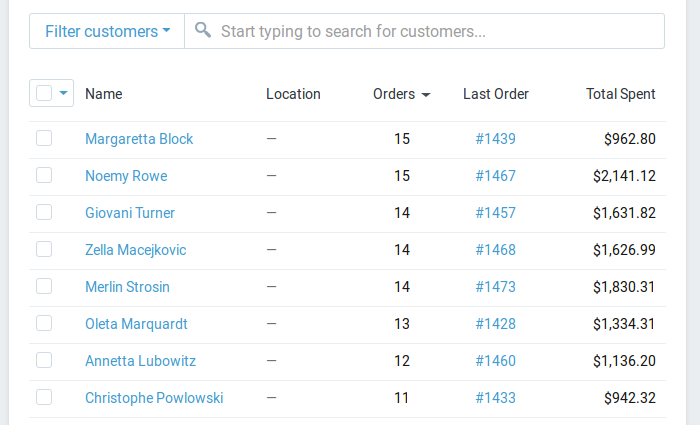The process of optimizing your store for retention isn't just one big A-to-Z task you complete once and check off.
It's a regular set of smaller processes where you perform experiments to try and improve different parts a little bit at a time. Combined, they all lead to significant improvements.
One set of improvements that can pay significant dividends is finding your drop-off points in repeat purchases.
Every store has regular customer behaviors. One store might get a lot of repeat buyers, but only around the holiday season. Another might have customers who come back every other month to replenish their products. A third store might sell 95% of their products to one-time buyers.
Whatever your customer behavior is, there are patterns you can pick up from it. These patterns can show you different areas improve:
- increasing the average order size
- speeding up repeat orders so they occur sooner
- fixing metric drop-offs
In this article we're going to look at the third one, finding and fixing repeat order drop-offs.
To do this, we're going be looking at all of your customers organized by the number of repeat orders they've placed.
These instructions will be on how to do this inside of the Shopify Customer Admin but if you have a lot of customers it might be easier to do this by exporting your customers into Excel.
1. Customers admin panel
First, login to your Shopify admin and visit your customer admin panel.
2. Sort by Orders
Click the Orders column to sort your customers by the number of orders from highest to lowest. You may need to click it again if it's sorting from lowest to highest.

3. Tally how many orders of each
Now using a sheet of paper or a blank document, tally the number of orders for each number.
For example, for my customers above I'd say:
- 15: 2
- 14: 3
- 13: 1
- 12: 1
- ...
Do this until you get to 0 orders, which you can skip. You only care about customers who have placed an order.
4. Roll up the number of orders
A customer who has placed 15 orders has actually placed all of the orders from 1-15 so we should count them in earlier stages too.
Start at the top with the highest and add the number of orders for each step to the step below it.
For example:
Adding on step 15's orders
- 15: 2
- 14: 3 + 2
- 13: 1 + 2
- 12: 1 + 2
- ...
Adding on step 14's orders
- 15: 2
- 14: 3 + 2
- 13: 1 + 2 + 3
- 12: 1 + 2 + 3
- ...
This will take some time and effort to do, but keep at it because it's the hardest part.
You might even consider putting this into Excel if you have experience with Excel and its formulas.
5. Add up the order counts
Once you rolled up the number of orders to each prior step, total them up so you have the number of orders placed in each step.
- 15: 2
- 14: 5
- 13: 6
- 12: 7
- ...
6. Calculate your repeat purchase rate for each step
Remember when we talked about the repeat purchase rate for your store as a whole?
Now we're going to calculate it for each step in your repeat orders. Just divide one step by the step below it:
- 15: 2 / 5 = 0.40 = 40%
- 14: 5 / 6 = 0.83 = 83%
- 13: 6 / 7 = 0.86 = 86%
- 12: 7 / 8 = 0.88 = 88%
- ...
7. Analyze your repeat purchase rate
Finally, you want to compare the repeat purchase rate for each step against the overall repeat purchase rate for your store as a whole.
Let's say you're getting a 45% repeat purchase rate. Your analysis would show:
Customers who have made their 11th purchase are making their 12th at a much higher rate than normal (88% vs 40%). The same goes for customers going from step 12 to 13 (86%) and from 13 to 14 (83%).
There is a huge drop-off for customers going from their 14th to 15th purchase though. At 40% it is lower than your overall store rate and less than half of the prior rates.
This is a significant drop-off that you're looking for.
8. Experiment and fix the drop-off
Now that you've spotted a drop-off, you'll want to look more closely at what happens in this stage of the customer's relationship. With our example being the 15th purchase, there could be a few things going on:
- this might be one of your first few customers and other customers haven't "aged" enough yet
- you might have introduced new shipping policies that are incentivizing customers to make one large order instead of multiple smaller orders
- these might be wholesale customers who order on a regular basis when compared to your retail customers
We focused this analysis on the last 4 steps of the repeat purchase process, but when you perform it yourself, you'll be going through all the steps. You should expect to see a few drop-offs, and at least one very early on like from 2 to 3 or 1 to 2.
Going though this process can be tedious but the data you collect from it will really guide the decisions your store makes around customer retention. If you're interested in having this analysis done completely and automatically for you, try out Repeat Customer Insights
How do your products determine customer behavior
In Repeat Customer Insights the Customer First Product analysis will measure customer behavior based on the products each customer first ordered.